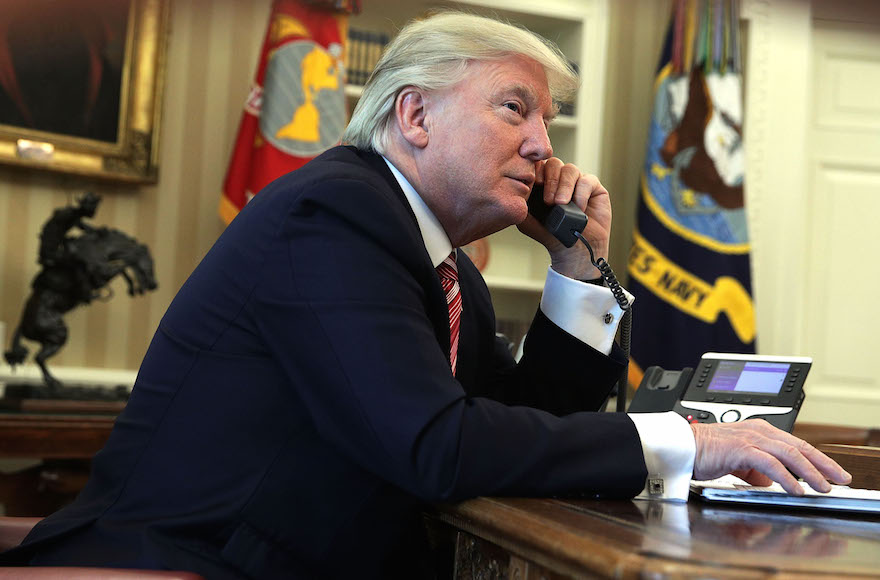(JTA) — The U.S. pullout from the nuclear deal with Iran triggered a European desertion of that country that is threatening its regime’s survival, President Donald Trump said.
Trump spoke about the issue Thursday during a Rosh Hashanah phone call with rabbis and Jewish leaders. Taking part in the 20-minute call were his son-in-law and adviser Jared Kushner; U.S. Ambassador to Israel David Friedman; the attorney and law professor Alan Dershowitz; and former U.S. Sen. Norm Coleman of Minnesota.
Trump did not invite questions from listeners, although Coleman and Dershowitz both asked questions. Last year, leaders of the Reconstructionist, Reform and Conservative streams declined to organize the annual pre-Rosh Hashanah call in the wake of Trump’s comments surrounding the Charlottesville white supremacist rally. This year’s invitation list leaned heavily toward Orthodox and hawkish pro-Israel groups, the Forward reported.
“Now the Europeans are finally leaving. They’re finally saying, ‘All right, look, this is just not working.’ You know, they tried to play hardball for a little while, but they’re now leaving and they’re doing the right thing,” Trump said about Iran.
In June, the French automaker Peugeot-Citroen said it intended to leave the Iranian market for fear of U.S. sanctions. Other European corporations that said they would leave Iran following the deal’s termination in May include the French energy firm Total; the Danish shipping giant Maersk; the German conglomerate Siemens; and the Russian energy firm Lukoil.
American corporations including General Electric, Honeywell and Boeing also announced that they were leaving Iran following the U.S. pullout from the deal. The Asian conglomerates Reliance, Mazda and Hyundai suspended contracts with Iran.
Trump has said that Iran did not live up to the spirit of the deal it reached with the United States and six other powers under former president Barack Obama in 2015. It offered Iran sanctions relief in return for its scaling back of parts of its nuclear program. Israel and Saudi Arabia opposed the deal, arguing it was too soft and that its 10-year time limitation period meant Iran could build nuclear weapons once it expires. But Obama, leaders of the European Union, which was a party in the deal, and other advocates said it was the best way to block Iran’s path to developing a nuclear bomb.
When the United States pulled out, it exposed European and other firms that do business with Iran to U.S. sanctions, forcing several of the firms to leave Iran. These developments, compounded by low oil prices, sent the Iranian currency into a free-fall. The rial hit a record low this week of around 150,000 against the dollar, compared to about 3,500 rial for one dollar in September 2016.
In the phone call Thursday, Trump said he did not anticipate the full scope of his actions on Iran.
“It turned out to have a much bigger impact than I thought. I did it primarily because of nuclear, but I knew it wouldn’t be great for their economy. I had no idea how devastating it would be,” he said.
In 2016, Trump said, “It was a question of when will they [Iran] take over the entire Middle East. And that probably includes Israel, in the mind of a lot of people.” Yet today, “they are now really looking to survive.”
He said the United States would be prepared to negotiate a new agreement with Iran if the latter seeks talks.
Trump also said that his former secretary of state, Rex Tillerson, “didn’t like terminating” the deal.
“I played the game for a while; I wish I did it sooner,” the president said. “But I played that little game for a while, and then ultimately I decided I’m just doing it. And I did it.”
In the talk, Trump and his interlocutors revisited major policy changes vis-à-vis Israel since he took office, including moving the U.S. Embassy to Jerusalem from Tel Aviv. The speakers thanked Trump for making the move. Trump said he encountered so much resistance from world leaders that he stopped taking their calls over the issue.
He also noted the U.S. announcement that it would pull out of the United Nations Human Rights Council over its anti-Israel bias and the decision to permanently stop making contributions to UNRWA, the U.N. aid agency for Palestinians.
Trump reiterated his belief that moving the embassy to Jerusalem took the subject “off the table,” clearing a path to peace negotiations between Israel and the Palestinians. The Palestinian Authority has said it will not engage in such talks, saying the United States is not an honest broker.
“I think it’s disrespectful when people don’t come to the table,” Trump said about the issue.
Regarding Rosh Hashanah, Trump said: “I send my warmest wishes to the Jewish people in the United States and around the world as we approach the High Holy Days. I want to express my deep admiration and gratitude for the extraordinary contributions of the Jewish people to the United States and to the world.”
Over the centuries, he said, “The Jewish people have suffered unthinkable persecution, yet you have not only endured, you have thrived and flourished as an example of humankind.”
His own “connection to Judaism is also personal,” Trump said. “I am the very proud father of a Jewish daughter, Ivanka, and my son-in-law, who I’m very proud of also — I will say that very loudly — Jared, and my several Jewish grandchildren, namely three beautiful Jewish grandchildren that I love.”
JTA has documented Jewish history in real-time for over a century. Keep our journalism strong by joining us in supporting independent, award-winning reporting.






